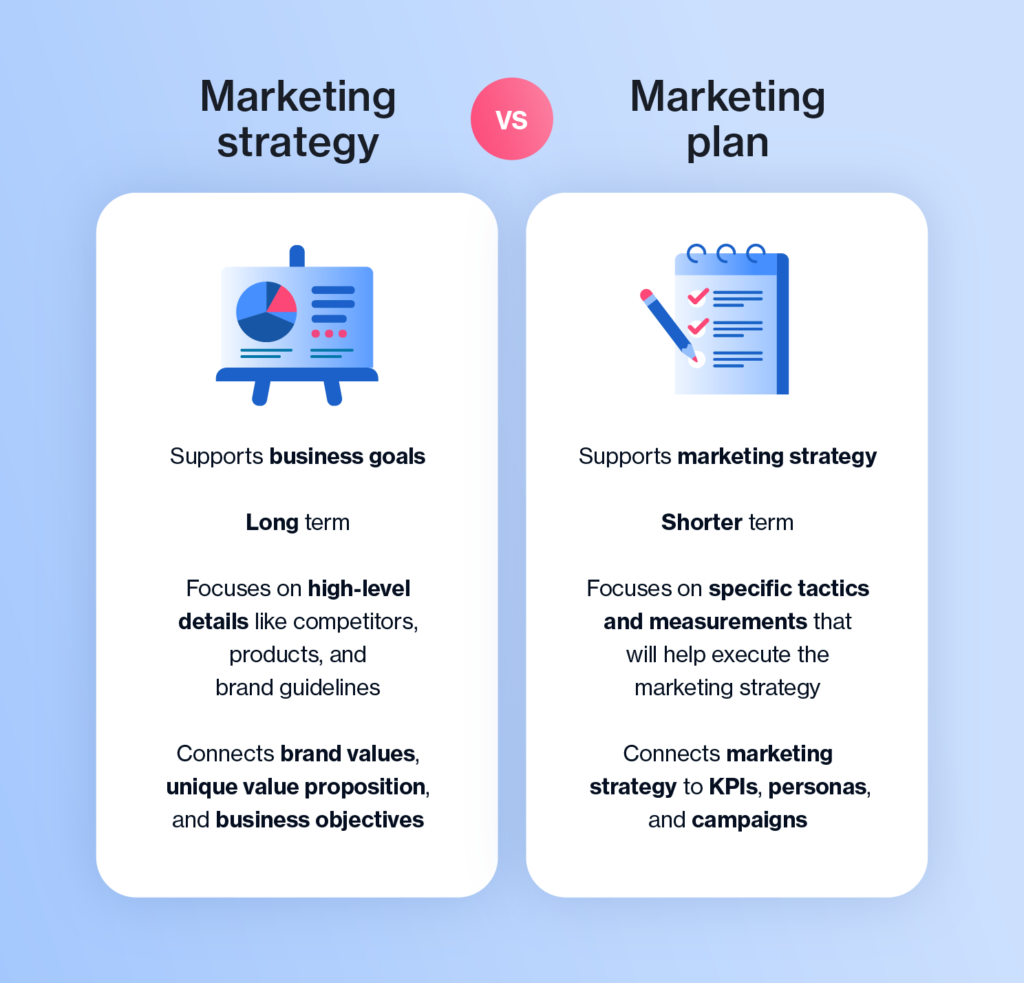|
Getting your Trinity Audio player ready...
|
In today’s dynamic business environment, the relationship between marketing strategy and marketing plan is paramount for businesses to blossom. By crafting a well-defined marketing strategy for companies and translating it into actionable plans, organizations can effectively navigate market challenges, seize growth opportunities, and position themselves for sustainable success. Throughout this discussion, we’ll look into the complexities of marketing strategy for business, examining how it shapes business strategy, target audience engagement, and competitive advantage. We’ll also dissect the elements of a marketing plan, from market research and segmentation to tactical execution and performance measurement. By the end of this blog, you’ll gain a deeper understanding of why marketing strategy and planning are important pillars of business success.
Top 5 Importance of Marketing Plan and Strategy For Business
- Clear Roadmap for Success: By crafting a well-defined marketing strategy for business, you can establish a roadmap for success, guiding all your marketing efforts towards achieving measurable objectives.
- Make Your Business Objectives Actionable: A marketing plan translates strategic objectives into actionable tactics. It provides a detailed roadmap for implementation, resource allocation, and performance measurement, facilitating efficient and effective execution of marketing initiatives.
- Alignment of Business Goals and Objectives: A well-crafted marketing plan ensures that the business and marketing strategies are aligned. It helps clarify the business’s goals, target market, and value proposition.
- Resource Optimization and Budget Allocation: A marketing plan helps in efficiently allocating resources and budget. By outlining specific marketing tactics, channels, and campaigns, businesses can prioritize where to invest their time and money for maximum impact.
- Understanding of Market Dynamics and Competitive Landscape: A marketing plan provides insights into the market dynamics and competitive landscape.This understanding enables businesses to identify opportunities and threats, anticipate market trends, and adjust their strategies accordingly. By staying informed about industry trends and competitor activities, businesses can stay ahead of the curve and maintain a competitive edge.

How Marketing Strategy For Business and Marketing Plan Work Together to Drive Business Success
Marketing strategy and marketing plan are essentially linked, each serving a distinct yet complementary role in achieving business objectives. While marketing strategy sets the direction and goals, a marketing plan translates these objectives into actionable tactics and initiatives. Think of marketing strategy as the guiding vision, and marketing plan as the tactical roadmap that brings that vision to life. Together, they create a cohesive framework that guides marketing efforts, maximizes efficiency, and drives business success.
While the business strategy sets overall goals and direction, the marketing strategy translates these goals into specific marketing initiatives. It ensures that marketing efforts are aligned with the organization’s mission and objectives, helping to maximize impact and ROI.
Importance of Aligning Your Marketing Strategy with Your Plans and Goals
Aligning marketing strategy with plans and goals is essential for driving results. When marketing efforts are closely tied to organizational objectives, they become more targeted and effective. By conducting thorough research about their target audience and crafting tailored strategies, businesses can ensure that their marketing initiatives are aligned with their overarching goals and aspirations.
Business Strategy: How to Identify Your Target Audience and Positioning
Central to any marketing strategy for business is a deep understanding of the target audience, their needs, preferences, and pain points. By segmenting the market and identifying specific customer segments, businesses can tailor their messaging and offerings to resonate with the intended audience effectively. Moreover, defining a compelling value proposition that highlights the unique benefits and advantages of the product or service is essential for differentiation and competitive advantage. Positioning in the market involves creating a distinct and favourable perception of the brand relative to competitors, ensuring that it occupies a desirable place in the minds of consumers. You must have a marketing plan to know if your marketing strategy would reach your identified audience
Read Also: 10 Effective Tips To Engage Your Audience Through Writing
Elements Involved in Creating a Marketing Plan for Business
A comprehensive marketing plan encompasses several key elements, each playing a crucial role in driving marketing plans and strategies effectively and efficiently:
- Market Research: Conducting thorough market research is essential for understanding market dynamics, consumer preferences, and competitive landscape. It involves gathering data, analyzing trends, and identifying opportunities and threats that may impact the business.
- Segmentation, Targeting, and Positioning (STP): Segmenting the market into distinct groups based on demographic, psychographic, and behavioural factors allows businesses to target specific customer segments effectively. Targeting involves selecting the most profitable segments to focus marketing efforts on, while positioning entails crafting a unique value proposition and positioning strategy to differentiate the brand in the minds of consumers.
- Marketing Tactics and Activities: This section outlines the specific marketing tactics and activities to achieve marketing objectives. It may include strategies for advertising, promotions, digital marketing, content marketing, social media marketing, public relations, and more.
- Implementation Plan: The plan details the timeline, responsibilities, and resources required to execute the marketing tactics effectively. It ensures that all stakeholders are aligned and accountable for executing the marketing plan.
A flexible marketing plan allows businesses to pivot quickly in response to changing circumstances, seize new opportunities, and mitigate risks effectively. The symbiotic relationship between marketing strategy and marketing plan is foundational to achieving business success in today’s dynamic marketplace. Throughout this blog, we’ve underscored the critical importance of strategic planning and execution in driving sustainable growth and maximizing business impact.
In conclusion, as businesses navigate the complexities of the modern marketplace, it is imperative to prioritize strategic planning and execution. By aligning marketing strategy and marketing plan with broader business objectives, organizations can maximize their impact, drive sustainable growth, and stay ahead of the competition.
Would you like an expert to create the best marketing strategy and marketing plan for your business? Scroll down to the bottom of this page and click on the Plan a Project button to get started or Click Here to see all our marketing services.


